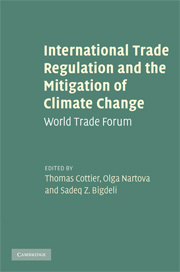Description
International Trade Regulation and the Mitigation of Climate Change
World Trade Forum
Coordinators: Cottier Thomas, Nartova Olga, Bigdeli Sadeq Z.
How can trade regulation contribute towards ameliorating the greenhouse gas emissions and reducing their concentrations in the atmosphere?
Language: English
Subject for International Trade Regulation and the Mitigation of...:
Publication date: 09-2009
456 p. · 16x23.4 cm · Hardback
456 p. · 16x23.4 cm · Hardback
Description
/li>Contents
/li>Biography
/li>
What can trade regulation contribute towards ameliorating the GHG emissions and reducing their concentrations in the atmosphere? This collection of essays analyses options for climate-change mitigation through the lens of the trade lawyer. By examining international law, and in particular the relevant WTO agreements, the authors address the areas of potential conflict between international trade law and international law on climate mitigation and, where possible, suggest ways to strengthen mutual supportiveness between the two regimes. They do so taking into account the drivers of human-induced climate change in energy markets and of consumption.
Part I. Climate Change Mitigation: Scientific, Political and International and Trade Law Perspectives: 1. Earth in the greenhouse – a challenge for the 21st century Thomas Stocker; 2. A survey of Kyoto tools for GHG reductions: speculations on post-Kyoto scenarios José Romero and Karine Siegwart; 3. International environmental law and the evolving concept of 'common concern of mankind' Thomas Cottier and Sofya Matteotti-Berkutova; 4. Domestic and international strategies to address climate change: an overview of the WTO legal issues Robert Howse and Antonia Eliason; Part II. Climate Change Mitigation and Trade in Goods: 5. How to think about PPMS and climate change Donald Regan; 6. Comment: tilting at conventional WTO wisdom Daniel C. Crosby; 7. Private climate change standards and labelling schemes under the WTO Agreement on Technical Barriers to Trade Arthur E. Appleton; Part III. Trade in Renewable Energy Sources: 8. Incentive schemes to promote renewables and the WTO law of subsidies Sadeq Z. Bigdeli; 9. Comment: The WTO and climate change incentives Gary Horlick; 10. Certifying biofuels: benefits for the environment, development and trade? Simonetta Zarrilli and Jennifer Burnett; Part IV. Climate Change Mitigation and Trade in Services: 11. GATS, financial services and trade in renewable energy certificates (RECs) – just another market-based solution to cope with the tragedy of the commons? Panagiotis Delimatsis and Despina Mavromati; 12. Assessment of GATS impact on climate change mitigation Olga Nartova; 13. Comments: GATS commitments on environmental services: 'hover through the fog and filthy air?' Rudolf Adlung; Part V. Climate Change and Technology Transfer, Investment and Government Procurement: Legal Issues: 14. International transfer of technologies: recent developments in the climate change context Felix Bloch; 15. TRIMs and the Clean Development Mechanism (CDM) – potential conflicts Stefan Rechsteiner, Christa Pfister and Fabian Martens; 16. Comment: Balancing investors' interests and global policy objectives in a carbon constrained world: the interface of international economic law with the Clean Development Mechanism Jacob D. Werksman; 17. Procurement policies, Kyoto compliance and the WTO Agreement on Government Procurement: the case of the EU's green electricity procurement and the PPMs debate Garba Malumfashi; 18. Comment: Procurement and the World Trade Organization: purchase power or pester power? Geert Van Calster; Part VI. Institutional Challenges and the Way Forward: 19. Institutional challenges to enhance policy coordination – how WTO rules could be utilized to meet climate objectives? Mireille Cossy and Gabrielle Marceau; 20. Environmental goods and services: the environmental area initiative approach and climate change Thomas Cottier and Donah Baracol-Pinhão.
Thomas Cottier is Professor of European and International Economic Law at the University of Bern and Director of the Institute of European and International Economic Law. He is also Managing Director of the World Trade Institute.
Olga Nartova is a qualified lawyer in Russia, a research fellow at the Swiss National Centre for Competence in Research (NCCR) Trade Regulation of the University of Bern, and alternate leader of a project on energy in WTO law and policy.
Sadeq Z. Bigdeli is a graduate of the University of Tehran Faculty of Law and Political Science and a summa cum laude graduate of the MILE programme at the World Trade Institute in Berne, Switzerland.
Olga Nartova is a qualified lawyer in Russia, a research fellow at the Swiss National Centre for Competence in Research (NCCR) Trade Regulation of the University of Bern, and alternate leader of a project on energy in WTO law and policy.
Sadeq Z. Bigdeli is a graduate of the University of Tehran Faculty of Law and Political Science and a summa cum laude graduate of the MILE programme at the World Trade Institute in Berne, Switzerland.
© 2024 LAVOISIER S.A.S.




